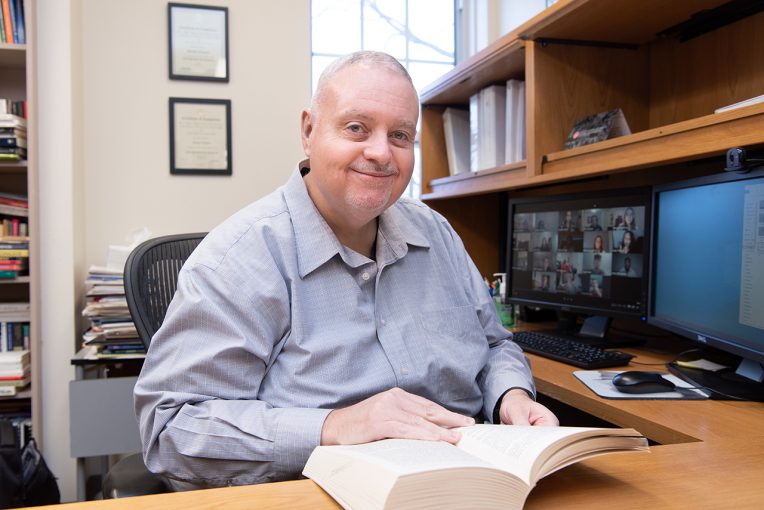Illinois State University’s Center for Civic Engagement is a place for students, faculty, and community members to become informed, well-rounded, and engaged citizens. The center was established to orchestrate the numerous efforts for civic engagement across campus and to seek new opportunities. The center annually seeks out Illinois State faculty to apply for a fellowship in civic engagement, which is a competitive process. Dr. Joseph Zompetti, professor in the School of Communication, won the fellowship for 2022 to study digital literacy.
Zompetti, in his 19th year of teaching as a full-time professor at Illinois State, teaches courses mostly relating to rhetoric, political communication, and intercultural communication. He has served on a number of committees, such as the curriculum committee and the academic grievance committee. He has been to 60 countries, where he has engaged in teaching and leading workshops. In Brussels, Belgium, he held workshops and training sessions about argumentation and debate.
Zompetti actively seeks internationalization of the School of Communication’s curriculum. His current research focuses on polarized political conversations fueled by disinformation and the purposeful use of inaccurate data, learning how to lower toxicity surrounding politics to create more meaningful conversations.
Being digitally literate includes having a true understanding of the consequences of social media’s algorithms and making a conscious effort to do one’s own research about other political ideologies. Zompetti emphasizes in his classes the importance of being critically informed about communities and politics and of gaining a new perspective.
“Algorithms lock us into information bubbles, and we don’t get to understand other ideologies, much less find ways of compromising and coming together,” Zompetti said. “They enhance polarization.”
For Zompetti, the Center for Civic Engagement is a place to help ensure democracy is pursued by getting individuals more involved in their community.
“Part of my core philosophy as a teacher and scholar is that, despite its problems, democracy is worth preserving, promoting, and saving,” he said. “It’s worth fighting for.”
During his fellowship on digital literacy, he explored how people can be more conscious of disinformation, biased sources, and effects of algorithms. Zompetti, along with undergraduate students Michael Severino and Hannah Delorto, developed a course module with key information about becoming more digitally literate that could easily be incorporated into a classroom or workshop.
This module features much information about digital literacy, various talking points and exercises to become more conscious of a person’s digital surroundings. After completion of the digital literacy module, Zompetti took it to The Civic Learning and Democratic Engagement conference in Minneapolis in the summer of 2022 to share with other educators. He also published a paper about the information and experiences from the fellowship. This published writing can reach a broader audience beyond Illinois State, while still representing the hard work that was achieved here.
During the fellowship, Zompetti learned many new connections between digital literacy, disinformation, and polarized political discourse. He emphasized the new ability to also have better conversations in the classroom and talk more deeply with his students about why literacy is important.
“The biggest thing that I learned through the fellowship was a better understanding of the consequences of social media algorithms and how dangerous they can be for democracy,” Zompetti said.

